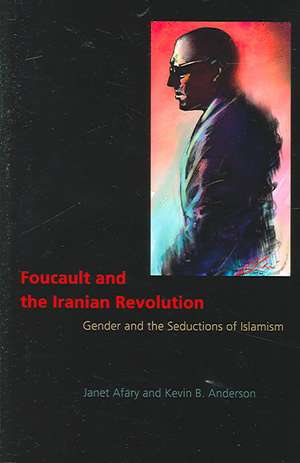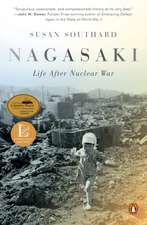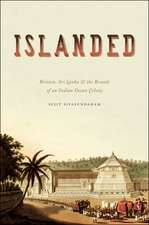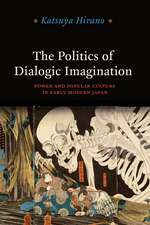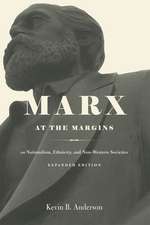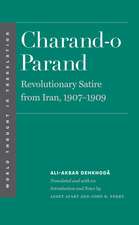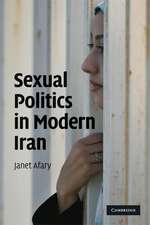Foucault and the Iranian Revolution: Gender and the Seductions of Islamism
Autor Janet Afary, Kevin B. Andersonen Limba Engleză Paperback – 20 iun 2005
In 1978, as the protests against the Shah of Iran reached their zenith, philosopher Michel Foucault was working as a special correspondent for Corriere della Sera and le Nouvel Observateur. During his little-known stint as a journalist, Foucault traveled to Iran, met with leaders like Ayatollah Khomeini, and wrote a series of articles on the revolution. Foucault and the Iranian Revolution is the first book-length analysis of these essays on Iran, the majority of which have never before appeared in English. Accompanying the analysis are annotated translations of the Iran writings in their entirety and the at times blistering responses from such contemporaneous critics as Middle East scholar Maxime Rodinson as well as comments on the revolution by feminist philosopher Simone de Beauvoir.
In this important and controversial account, Janet Afary and Kevin B. Anderson illuminate Foucault's support of the Islamist movement. They also show how Foucault's experiences in Iran contributed to a turning point in his thought, influencing his ideas on the Enlightenment, homosexuality, and his search for political spirituality. Foucault and the Iranian Revolution informs current discussion on the divisions that have reemerged among Western intellectuals over the response to radical Islamism after September 11. Foucault's provocative writings are thus essential for understanding the history and the future of the West's relationship with Iran and, more generally, to political Islam. In their examination of these journalistic pieces, Afary and Anderson offer a surprising glimpse into the mind of a celebrated thinker.
In this important and controversial account, Janet Afary and Kevin B. Anderson illuminate Foucault's support of the Islamist movement. They also show how Foucault's experiences in Iran contributed to a turning point in his thought, influencing his ideas on the Enlightenment, homosexuality, and his search for political spirituality. Foucault and the Iranian Revolution informs current discussion on the divisions that have reemerged among Western intellectuals over the response to radical Islamism after September 11. Foucault's provocative writings are thus essential for understanding the history and the future of the West's relationship with Iran and, more generally, to political Islam. In their examination of these journalistic pieces, Afary and Anderson offer a surprising glimpse into the mind of a celebrated thinker.
Preț: 258.74 lei
Nou
Puncte Express: 388
Preț estimativ în valută:
49.51€ • 51.80$ • 41.13£
49.51€ • 51.80$ • 41.13£
Carte tipărită la comandă
Livrare economică 02-16 aprilie
Preluare comenzi: 021 569.72.76
Specificații
ISBN-13: 9780226007861
ISBN-10: 0226007863
Pagini: 312
Dimensiuni: 152 x 229 x 23 mm
Greutate: 0.48 kg
Ediția:annotated ed.
Editura: University of Chicago Press
Colecția University of Chicago Press
ISBN-10: 0226007863
Pagini: 312
Dimensiuni: 152 x 229 x 23 mm
Greutate: 0.48 kg
Ediția:annotated ed.
Editura: University of Chicago Press
Colecția University of Chicago Press
Notă biografică
Janet Afary is associate professor of history and women's studies at Purdue University. She is the author of The Iranian Constitutional Revolution, 1906-1911, and current president of the International Society for Iranian Studies. Kevin B. Anderson is associate professor of political science and sociology at Purdue University and the author of Lenin, Hegel, and Western Marxism.
Cuprins
Acknowledgments
Introduction
Part IFoucault's Discourse: On Pinnacles and Pitfalls
1. The Paradoxical World of Foucault: The Modern and the Traditional Social Orders
2. Processions, Passion Plays, and Rites of Penance: Foucault, Shi'ism, and Early Christian Rituals
Part IIFoucault's Writings on the Iranian Revolution and After
3. The Visits to Iran and the Controversies with "Atoussa H." and Maxime Rodinson
4. Debating the Outcome of the Revolution, Especially on Women's Rights
5. Foucault, Gender, and Male Homosexualities in Mediterranean and Muslim Societies
Epilogue: From the Iranian Revolution to September 11, 2001
Appendix: Foucault and His Critics, an Annotated Translation
Notes
References
Index
Introduction
Part IFoucault's Discourse: On Pinnacles and Pitfalls
1. The Paradoxical World of Foucault: The Modern and the Traditional Social Orders
2. Processions, Passion Plays, and Rites of Penance: Foucault, Shi'ism, and Early Christian Rituals
Part IIFoucault's Writings on the Iranian Revolution and After
3. The Visits to Iran and the Controversies with "Atoussa H." and Maxime Rodinson
4. Debating the Outcome of the Revolution, Especially on Women's Rights
5. Foucault, Gender, and Male Homosexualities in Mediterranean and Muslim Societies
Epilogue: From the Iranian Revolution to September 11, 2001
Appendix: Foucault and His Critics, an Annotated Translation
Notes
References
Index
